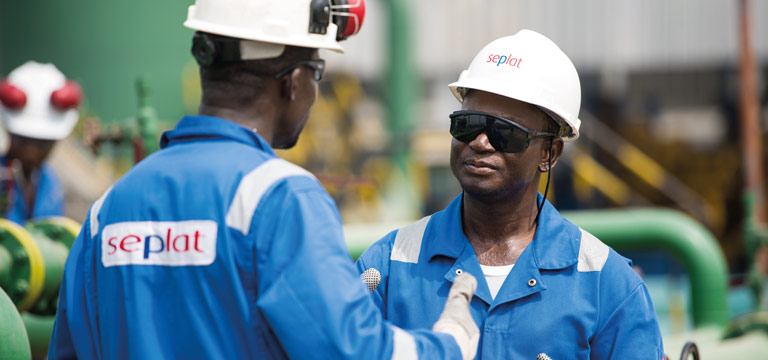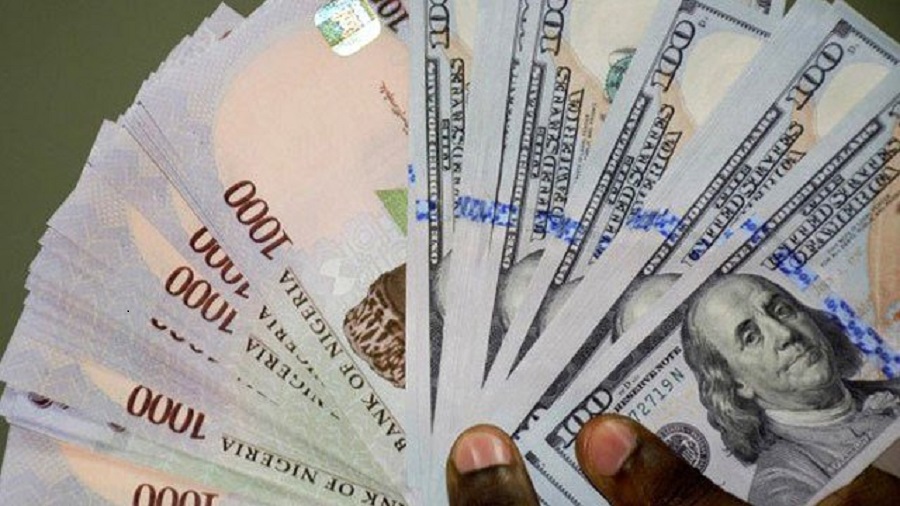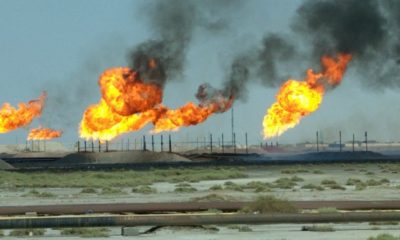Economy
Seplat Plc: Will the Bulls Crossover?

By ARM Research
Following our last note, Seplat Plc – Revision to Forecast published on Nov 7th, Seplat has returned 20.5% with YTD return of 57%.
Much of the early gains was underpinned by the lifting of force majeure on the Trans-Forcados Pipeline (TFP) which drove a marked rebound in performance in the third quarter of 2017 with the company posting profit after tax (PAT) of $22.3million, after realizing losses in six consecutive quarters.
Particularly, oil revenue at $115million almost doubled from the prior quarter, anchored by higher production of 26.4kbpd while gas sales remained resilient posting $31.5 million (+7.5% QoQ) as gross daily gas output touched a high of 352Mscfd (working interest: 111Mscfd).
At the latter, it was a play of cheap valuation and bargain hunting. In sync with our investment case for Seplat which tilts towards 2018 wherein we had projected a substantial upside in earnings hinged on balance sheet deleveraging as well as improved and more stable P&L.
Our view was premised on the company’s return to past production levels and de-risked earnings via the addition of a new export route to existing two routes.
Consequently, we had earlier forecasted a 90-day downtime in 2018 with working interest production forecast of 45.5bopd and over four-fold increase in PAT to $108.6 million (2017E: $19.4 million). In line with this adjustment, Seplat remained well positioned to relatively outperform its larger peers, trading at a 2018 P/CF of 1.7x compared to African peers’ and FTSE 350 Oil & Gas index of 5.5x and 12.05x respectively. As it stands, the stock is currently trading at a premium of 130bps to our last communicated FVE of N588.11.
So how does it look from here?
Beyond our earlier views on higher production, lower all-in cost, balance sheet deleveraging and deceleration in Capex which should drive cash-flow and ROE improvement, the recent rally in crude oil prices (Brent) and Seplat’ s tax allowance provision (estimate: $98 million) provides fresh upside to earnings.
Riding the oil price upswing. As a pure E&P play, Seplat’s earnings are more sensitive to oil prices. Consequently, we run a scenario analysis of 2018 key financial metrics at varying crude oil prices while keeping our production forecast intact. From our analysis, every $5/bbl. increase in Brent crude prices could lift 2018 earnings by ~25%; while every $5/bbl increase in long-term oil price could raise our FVE by about N45/share or 8%.
We have now raised our 2018 earnings by 26% in FY 2018, in line with the accelerated rebalancing in the crude oil market and house views on 2018 Brent price (base case of $60/bbl.). However, crude oil prices below $40/bbl. and a reappearance of insecurity in the Niger delta may trigger a downward review to earnings.
Balance sheet should de-leverage significantly. We think net debt to free cash flow will fall sizably from the current level of 1.7x to 1.2x by FY 18. Seplat is expected to rake in stronger operating cash flows of c.$300million over 2018 well above capital spending (estimate: $20 million capex). With the significant deleveraging in the balance sheet based on our estimates, there is clear capacity for enhanced shareholder return via resumption of dividend payments in 2018. Furthermore, while Seplat has no explicit dividend policy, we find that full-year dividend per share (DPS) has displayed strong correlation to its operating cash flow per share. Thus, with earnings and operating cash flow expected to rebound in FY 2018 on higher oil prices and production, we assume that DPS in FY 2018 will be $0.05.
Key Risks. Lower-than-expected oil prices and production are the key risks. The most apparent near-term driver for such a scenario would be an increase in US crude oil supply as well as the risk of OPEC falling apart. Upside risk would stem from the contrary, if oil prices increase above projected levels. Also, return of security concerns in the Niger Delta in the run-up to election is another key risk to earnings. However, with three alternative export routes, Seplat is in a better position than prior year.
Valuation is more compelling. We raise our FVE from N588.11 to N663.85 after reviewing our model and considering the possibility of higher crude oil prices. Our revised target equates to 2018 P/E and P/CF of 5.0x and 1.4x compared with African peers of 14.4x and 3.5x respectively.
Source: ARM Securities Limited
“All rights reserved. This publication or any portion thereof may not be reproduced or used in any manner whatsoever without the express written permission of ARM Securities Limited.”
Economy
Investors Lose N73bn as Bears Tighten Grip on Stock Exchange

By Dipo Olowookere
The bears consolidated their dominance on the Nigerian Exchange (NGX) Limited on Wednesday, inflicting an additional 0.09 per cent cut on the market.
At midweek, the market capitalisation of the domestic stock exchange went down by N73 billion to N124.754 trillion from the preceding day’s N124.827 trillion, and the All-Share Index (ASI) slipped by 114.32 points to 194,370.20 points from 194,484.52 points.
A look at the sectoral performance showed that only the consumer goods index closed in green, gaining 1.19 per cent due to buying pressure.
However, sustained profit-taking weakened the insurance space by 3.79 per cent, the banking index slumped by 2.07 per cent, the energy counter went down by 0.24 per cent, and the industrial goods sector shrank by 0.22 per cent.
Business Post reports that 25 equities ended on the gainers’ chart, and 54 equities finished on the losers’ table, representing a negative market breadth index and weak investor sentiment.
RT Briscoe lost 10.00 per cent to sell for N10.35, ABC Transport crashed by 10.00 per cent to N6.75, SAHCO depreciated by 9.98 per cent to N139.35, Haldane McCall gave up 9.93 per cent to trade at N3.99, and Vitafoam Nigeria decreased by 9.93 per cent to N112.50.
Conversely, Jaiz Bank gained 9.95 per cent to settle at N14.03, Okomu Oil appreciated by 9.93 per cent to N1,765.00, Trans-nationwide Express chalked up 9.77 per cent to close at N2.36, Fortis Global Insurance moved up by 9.72 per cent to 79 Kobo, and Champion Breweries rose by 5.39 per cent to N17.60.
Yesterday, 1.4 billion shares worth N46.2 billion were transacted in 70,222 deals compared with the 1.1 billion shares valued at N53.4 billion traded in 72,218 deals a day earlier, implying a rise in the trading volume by 27.27 per cent, and a decline in the trading value and number of deals by 13.48 per cent and 2.76 per cent, respectively.
Fortis Global Insurance ended the session as the busiest stock after trading 193.7 million units for N152.7 million, Zenith Bank transacted 120.7 million units worth N11.1 billion, Japaul exchanged 114.8 million units valued at N407.0 million, Ellah Lakes sold 98.4 million units worth N999.2 million, and Access Holdings traded 63.1 million units valued at N1.7 billion.
Economy
Naira Extends Losing Streak, Falls to N1,356/$1 at NAFEX

By Adedapo Adesanya
A 74 Kobo or 0.05 per cent decline was recorded by the Naira against the United States Dollar in the Nigerian Autonomous Foreign Exchange Market (NAFEX) on Wednesday, February 25, trading at N1,356.11/$1 compared with the N1,355.37/$1 it was traded on Tuesday.
The Nigerian currency also further depreciated against the Pound Sterling during the session in the official market by N6.70 to settle at N1,834.96/£1 versus the preceding day’s rate of N1,828.26/£1, and against the Euro, it tumbled by N4.94 to quote at N1,598.59/€1 compared with the previous session’s N1,596.36/€1.
In the same vein, the Nigerian Naira lost N6 against the Dollar at the GTBank forex desk to close at N1,367/$1, in contrast to N1,361/$1 it was exchanged a day earlier, and in the parallel market, it traded flat at N1,365/$1.
The continuation of the decline of the local currency has been tied to the Central Bank of Nigeria (CBN) buying US Dollars from the market to slow the rapid rise of the Naira.
The apex bank bought about $189.80 million to reduce excess Dollar supply and control how fast the Naira was gaining value.
The monetary policy committee (MPC) of the CBN on Tuesday reduced interest rates by 50 basis points to 26.50 per cent from 27 per cent after inflation eased in January 2026, a move analysts say is the best not to unsettle FX market, especially the Foreign Portfolio Investors (FPI_ inflows which have anchored much of the recent supply and weakened the recently restored monetary credibility.
“The 50bps move therefore provides a clear directional signal while still keeping overall monetary conditions restrictive, indicating the start of a shallow, data-dependent easing cycle rather than a radical shift to accommodative policy,” said Mr Kayode Akindele, CEO, Coronation Capital and Head, Coronation Research in an email.
As for the cryptocurrency market, benchmarked tokens rebounded in double digits, driven by bearish positioning and thin liquidity rather than by clear fundamental catalysts, with Cardano (ADA) growing by 16.2 per cent to $0.3015, and Solana (SOL) appreciating by 12.3 per cent to $88.66.
Further, Ethereum (ETH) surged 11.9 per cent to $2,076.66, Litecoin (LTC) expanded by 11.5 per cent to $57.15, Dogecoin (DOGE) rose by 11.5 per cent to $0.1025, Binance Coin (BNB) advanced by 7.6 per cent to $629.76, Ripple (XRP) jumped 7.2 per cent to $1.45, and Bitcoin (BTC) added 6.4 per cent to sell for $68,136.72, while the US Dollar Tether (USDT) and the US Dollar Coin (USDC) remained unchanged at $1.00 apiece.
Economy
Oil Prices Stabilise as US Crude Build Counters Supply Disruption Threat

By Adedapo Adesanya
Oil prices settled largely unchanged on Wednesday amid a build in American crude stockpile and the threat to oil supply from potential military conflict between the US and Iran.
Brent futures chalked up 8 cents to trade at $70.85 a barrel, while the US West Texas Intermediate (WTI) futures settled lost 21 cents to close at $65.42 per barrel.
Crude oil inventories in the US increased by 16 million barrels during the week ending February 20, according to new data from the US Energy Information Administration (EIA) released on Wednesday.
The decrease brings commercial stockpiles to 435.8 million barrels according to government data, which is still 3% below the five-year average for this time of year.
The EIA’s data release follows figures by the American Petroleum Institute (API) that were released a day earlier, which reported that crude oil inventories rose by a massive 11.4 million barrels in the period.
The market continued to weigh the possibility extended conflict could disrupt supplies from Iran, the third-biggest crude producer in the Organisation of the Petroleum Exporting Countries (OPEC) and other countries in the Middle East.
US President Donald Trump verbally attacked Iran, saying he would not allow a country he described as the world’s biggest sponsor of terrorism to have a nuclear weapon.
This comes as US envoys are due to meet an Iranian delegation for a third round of talks on Thursday in Geneva, Switzerland.
Reuters reported that OPEC+ is considering raising its oil output by 137,000 barrels per day for April to end a three-month pause in production increases. This is as the group prepares for peak summer demand and tensions between the US and Iran boost prices.
Eight OPEC+ producers – Saudi Arabia, Russia, the United Arab Emirates, Kazakhstan, Kuwait, Iraq, Algeria and Oman – meet on March 1.
An increase of 137,000 barrels per day for April would be the same as those agreed for December, November and October last year.
In a separate development, Saudi Arabia has activated a plan for a short-term oil output and export surge in case a US strike on Iran disrupts flows from the Middle East, said two sources familiar with the Saudi plan.
Tariff uncertainty also further worried investors after President Trump’s temporary global tariff of 10 per cent took effect on Tuesday after the Supreme Court’s sweeping ruling last week. He later said the levy would be 15 per cent, but it was unclear when and if it would apply.
-

 Feature/OPED6 years ago
Feature/OPED6 years agoDavos was Different this year
-
Travel/Tourism10 years ago
Lagos Seals Western Lodge Hotel In Ikorodu
-

 Showbiz3 years ago
Showbiz3 years agoEstranged Lover Releases Videos of Empress Njamah Bathing
-

 Banking8 years ago
Banking8 years agoSort Codes of GTBank Branches in Nigeria
-

 Economy3 years ago
Economy3 years agoSubsidy Removal: CNG at N130 Per Litre Cheaper Than Petrol—IPMAN
-

 Banking3 years ago
Banking3 years agoSort Codes of UBA Branches in Nigeria
-

 Banking3 years ago
Banking3 years agoFirst Bank Announces Planned Downtime
-

 Sports3 years ago
Sports3 years agoHighest Paid Nigerian Footballer – How Much Do Nigerian Footballers Earn


















